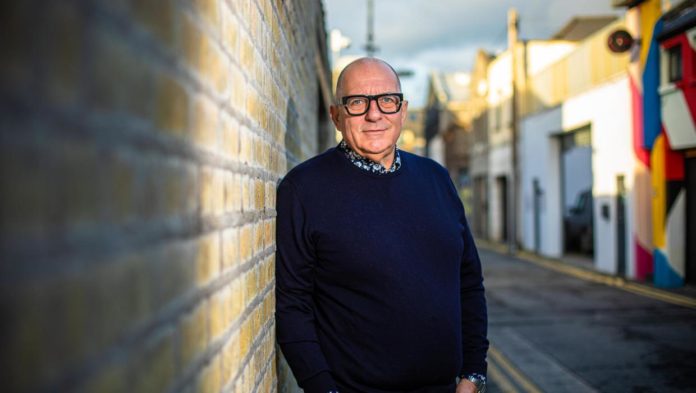Growing up, Hugh Wallace felt like something of an outsider. The Home of the Year judge was an only child raised in Dundrum, Dublin in a “bubble of Protestantism” that was conservative and extremely insular.
e didn’t meet any Catholics until he attended Bolton Street College to study architecture — that’s quite a feat living in 1960s Ireland. And he definitely didn’t know anybody of the same sexuality.
“I didn’t want to be gay,” he says. “Particularly at that time in Ireland. Sure, I didn’t know anyone gay. “That’s the truth… because everyone was in the closet, with the door locked. And then they would jump out every so often.”
In his twenties, Wallace took a formative trip to New York during a year out of college. The vibrant nightlife and thudding energy of Manhattan was a million miles away from his south Dublin home.
It was an exhilarating few days — and the first time he started to feel like he fitted in. “I had a fabulous time, I met people, I went to Studio 54, went to all the clubs… I can’t describe the relief. It was palpable… the relief of not being alone, and the relief knowing there were others. I wasn’t abnormal.”
He returned to Ireland and although he was more at ease in his skin, the country remained light years behind New York.
Homosexuality was illegal and he encountered intense and violent instances of homophobia. Once, when leaving Hooray Henrys, a popular gay nightclub on South Anne Street in the early 90s, someone cornered him and held a jagged glass bottle against his throat.
“Someone decided I was queer and they shoved a broken bottle at my neck. I was very lucky I had 50 quid on me and they went away. But that was terrifying.”
It took him several days to process the trauma of what he had experienced. “I went home and went to sleep and then two nights later I was in agony. It took a few days to analyse it, all he had to do was shove [the bottle] and my artery would have been gone.”
Over the years he encountered homophobic slurs, with people hurling insults as they passed him. “You did get people screaming out the car at you ‘ya queers!’… queer was derogatory in my 30s, 40s and 50s but today it is back in. I’m ‘queer’ and I love that.”
Today, the 64-year-old is busy in his architectural firm, chatting away over Zoom in his trademark thick, black-framed spectacles. He has had plenty to keep him occupied over the past few months between consultation work with his regarded practice Douglas Wallace Architects (which recorded profits of €133,557 last year), and filming schedules.
For most people, Hugh is familiar as the longest standing judge on RTÉ’s ratings winner Home of the Year.
Unlike most ‘starchitects’, he’s not dead set on minimalism. Viewers like his enthusiasm, his eclectic taste, and his penchant for nice scarves.
His voice reverberates deeply as he waves into the camera and talks about what’s going to be big in design in the coming years (upcycling mainly) and the thrill of renovating not one, but two, glebe houses.
While business did well, he found the pandemic a challenge. “I found the lockdown this year very hard. God almighty it went on, and on, and on. I found that difficult,” he says. “You would wake up some days and it was like Groundhog Day. It was all so depressing.”
Hugh has been sober eight years but relapsed during the course of the pandemic. It was a reality for many people with drinking problems; isolation and a lack of recovery meetings sabotaged stretches of sobriety.
“I have had relapses but that happens,” he says. “There is the guilt of having a relapse but you have to dust yourself off, and get on.”
Hugh realised he had a serious drinking problem during a heated physical fight with his husband Martin many years ago.
It caused him to take stock of his life and the path he was on. “I had a choice: I could drink myself to death or I could live,” he says. “And I have created a life, and found myself, and found my person. I was given an opportunity and took that opportunity and that moment of clarity.”
He was fortunate, he says, that his husband Martin helped “navigate him through that period” and steer him on the road to sobriety.
Hugh and Martin, the proprietor and lead stylist at Origin Hair Company in Ranelagh, have been together for 35 years.
Martin picked him up on the staircase of The George bar in Dublin — the launching pad for so many great romances.
The start of their relationship had its challenges — Hugh was 30 and Martin was 18 — and their love was forbidden.
“It was a very different Ireland,” he says. “And if you explain it to anyone under 30 they say ‘what are you talking about?’ But we were illegal, what we were doing, the relationship was illegal…”
It was not love at first sight for the couple. It took over a year for them to realise how much they cared for one another. Hugh believes that slow burn has been the secret to longevity in their relationship.
“I think that’s why it is so strong because we took time,” he says. “Martin, in the first years, he would go away for the summers to Mykonos… we always took different holidays. I think that is important. Not to live in each other’s pockets. Martin also has a very different personality and I think that is what makes it work.”
The couple had a civil ceremony in Locks Brasserie before getting married once the Marriage Equality Act passed. He says it is incredible to think how much attitudes have changed towards homosexuality in Ireland. Both he and Martin knew the tide was turning in the 90s when they were inundated with dinner-party invites.
“We became a must-have,” he laughs. “We were invited … [so people] could show how liberal and open-minded they were.”
Hugh was cast in Home of the Year in 2015 after winning a lifetime achievement award from the Institute of Designers. Despite having no previous television experience, he knew it was going to be an instant hit. “I knew people would love it. It’s inspirational TV — our houses are not just buildings, they are an extension of our personality.”
He was right. Property shows are catnip for Irish viewers, be it Room to Improve, Cheap Irish Houses, The Great House Revival, Home Rescue or DIY SOS.
During the pandemic, our need to transform our homes became more pressing. “I think people looked around their houses and thought, ‘oh my God, how do I spend time in this place?’”
With the appetite for property programming far from waning, Wallace is back with a new series, My Bungalow Bliss, inspired by Kells-born Jack Fitzsimons’ bestselling book, first published in 1971.
Nowadays, bungalows are rarely seen as innovative examples of architectural design but Fitzsimons’ booklet of basic, one-storey plans revolutionised Ireland’s social and architectural landscape.
In the 1960s, 60pc of rural homes didn’t have toilets. Most people in rural communities lived in a state of abject poverty, and his booklet gave them a roadmap to work around town planning regulations and build safe, warm, modern homes (with toilets) for themselves. The book, and every one of the 11 subsequent editions, became the number one best-seller in Ireland.
Over the years a huge degree of snobbery has been levelled at the humble bungalow. Irish Times Environment Correspondent Frank McDonald referred to the thousands of bungalows popping up around the country as a blight spreading like a fungus.
According to Wallace, this condescension still exists. “Townies drive around the countryside and go ‘oh my gawd, those bungalows are ruining my view’,” he says.
But he loves them. “I think they are amazing. I think they served such an amazing purpose when they were originally conceived by Jack.”
His new series will follow the refurbishment of four 1970s, 80s and 90s bungalows around the country with the help of four young architects.
It’s impossible when talking about homes and property for the conversation not to turn towards the housing crisis. Some critics believe the raft of property programmes can feed into our unhealthy national obsession with home ownership.
In 2019, former RTÉ employee Damien Tiernan criticised Room To Improve on Twitter. The show he said played “on people’s greed, opulence and avarice. And RTÉ promotes it as entertainment? Pathetic”.
Wallace does not think such criticism is fair. The housing crisis, he says, is entirely down to Government incompetence.
He cites the delays to phase out the Strategic Housing Developments legislation and replace it with the Large-scale Residential Development Bill as an example of incompetency.
“It is now in the cuckoo land of the Dáil where they are incapable, and have shown their inability for decades… to resolve our housing crisis. He continues: “There is mad stuff going on — like why is there no social housing being built… it is just beyond me…
“Why has no one gone to jail over the mica scandal? Somebody should be in jail. We are decades into a housing crisis and we are decades away from solving the housing crisis.”
He believes we all have a desire to create a secure base, and acknowledges how completely destabilising it is when that is not available to you.
“I think not having a home and not having the ability to have some permanent residence or security is a complete mind f***… because it consumes you,” he says.
“You think, ‘Will I still be there? Won’t I? Will I be able to pay the rent?’ Your mind rolls and your mind plays games.”
How to solve the crisis is a million-dollar question. One thing is certain, we could do with some of that imaginative thinking that Jack Fitzsimons had.
‘My Bungalow Bliss’ will air on RTÉ One on December 1 at 8.30pm








